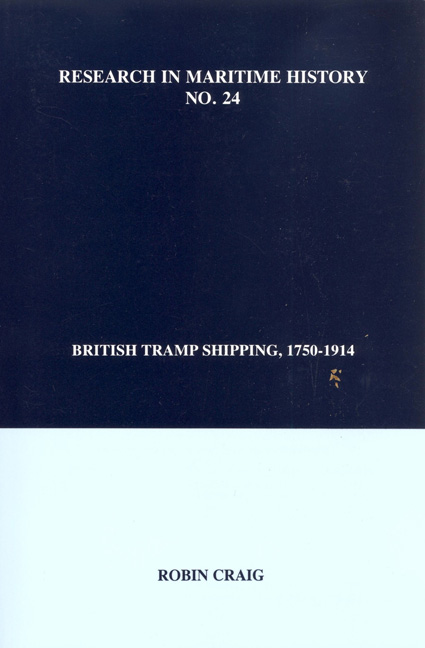Book contents
- Frontmatter
- Contents
- Introduction
- Tramp Shipping and Ownership
- The Trades
- The Seamen
- Tramp-Shipping Regions
- A. Wales
- B. The Northwest
- “Some Aspects of the Trade and Shipping of the River Dee in the Eighteenth Century”
- “Shipping and Shipbuilding in the Port of Chester in the Eighteenth and Early Nineteenth Centuries”
- C. The West Country
- D. The Northeast
- E. The Southeast
- F. The British Empire: Maritime Canada
- Bibliography
“Shipping and Shipbuilding in the Port of Chester in the Eighteenth and Early Nineteenth Centuries”
from B. The Northwest
- Frontmatter
- Contents
- Introduction
- Tramp Shipping and Ownership
- The Trades
- The Seamen
- Tramp-Shipping Regions
- A. Wales
- B. The Northwest
- “Some Aspects of the Trade and Shipping of the River Dee in the Eighteenth Century”
- “Shipping and Shipbuilding in the Port of Chester in the Eighteenth and Early Nineteenth Centuries”
- C. The West Country
- D. The Northeast
- E. The Southeast
- F. The British Empire: Maritime Canada
- Bibliography
Summary
In a previous paper, some account has been given of the efforts to improve the navigation of the River Dee in the eighteenth century, and some quantitative analysis attempted of the nature and extent of trade to and from the estuary. The present paper is concerned more particularly with the trades in which Chester's own shipping was deployed, since a distinction should be drawn between the total shipping involved in a port's trade and the extent to which local shipping participated in it. (For example, in the coal trade of South Wales, Welsh shipping played a relatively small part until the end of the eighteenth century.) Similarly, much of Chester's trade seems to have been carried on in shipping owned elsewhere, but, on the other hand, Chester-owned shipping may be found participating in the trade of other ports to an extent which was perhaps unusual among ports of similar size. In this paper, first the nature of Chester's own shipping is discussed, and then some brief illustrations are given of how such tonnage was employed in more distant waters. Next there follows a necessarily short account, based on the scanty records available, of some of the shipowners involved, and, finally, attention is drawn to an important element in the mercantile economy of the estuary - the nature and extent of shipbuilding during the period. However, it must be emphasised at the outset that what follows is based almost exclusively upon records available in London, some of which hitherto have been seldom utilised in studies of the maritime history of British ports. Much remains to be done by the local historian familiar with local records, who may expand and modify this account of the shipping of Chester in the eighteenth century.
Chester Shipping
A return made in 1701 gives the number of vessels owned at Chester as twenty-five, totalling 1925 tons and employing 196 men. For the years between 1702 and 1782 there exists a series of figures showing the total tonnage of shipping owned at each of the outports, but unfortunately it does not give the number of vessels so owned. The figures for Chester are given in table 1.
- Type
- Chapter
- Information
- British Tramp Shipping, 1750–1914 , pp. 293 - 326Publisher: Liverpool University PressPrint publication year: 2003

